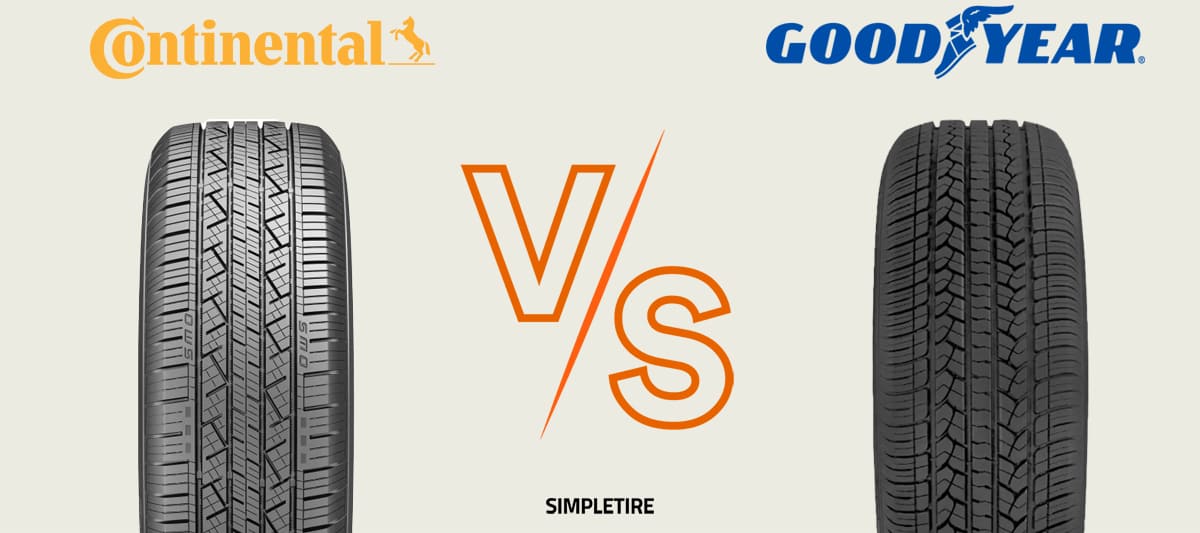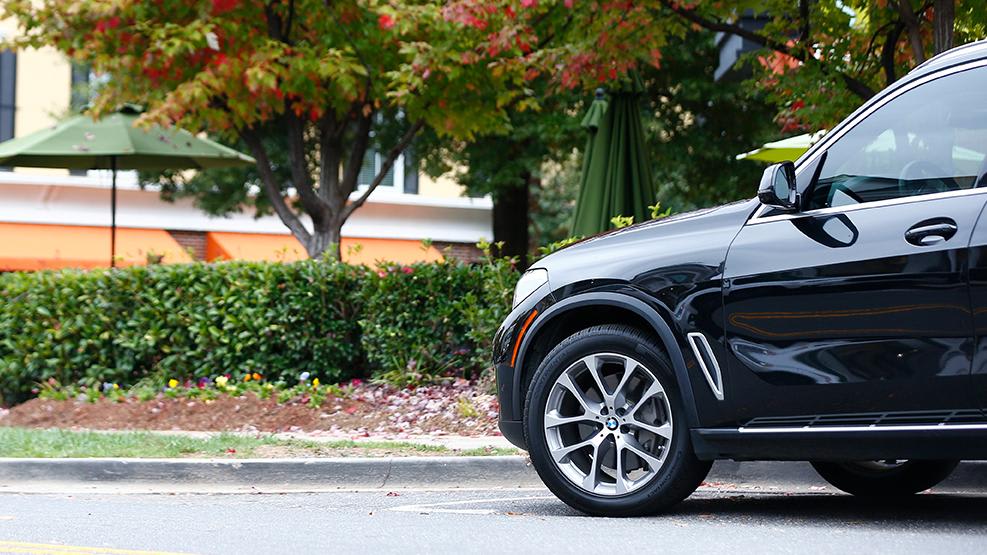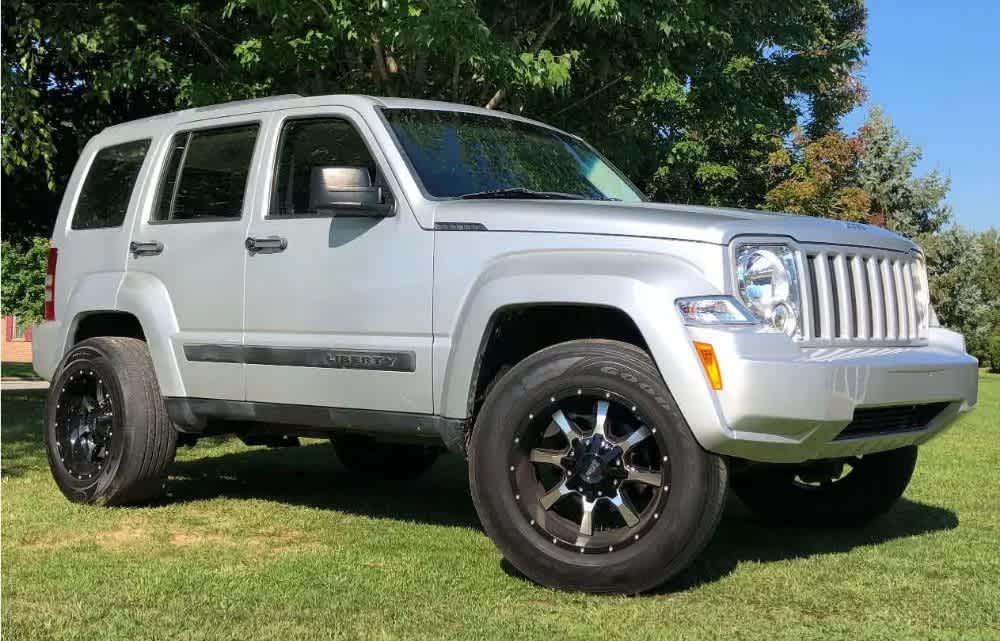Compare
Best price guarantee
Tire replacement coverage
24/7 roadside assistance
Easy returns

When it comes to premium all-season touring tires for crossovers and SUVs, Continental and Goodyear are always going to be some of the best options available. Both tire manufacturers have over a century in the business as leaders in engineering, manufacturing, and design, have decades of experience in motorsports (informing the development of their consumer tires), and have a very strong reputation for innovation and quality. All-season tires are, of course, the perfect fit for many drivers thanks to their balance of great wear properties, an accommodating ride with low noise, handling that’s sharp and capable, and dependable performance year-round in just about every kind of weather conditions other than heavy snow. When you’re looking for all-season tires for crossovers and SUVs, you know that Continental and Goodyear are going to offer the kinds of tires that will more than meet your expectations.
In this head-to-head matchup, the Goodyear and the Continental both have one thing in common: low-rolling-resistance designs. That means lowering the friction involved to get a vehicle moving and keep it heading down the road, resulting in lower emissions and improved fuel economy over the life of the tire, and that’s a factor that’s becoming increasingly important to a lot of drivers. The emphasis on low rolling resistance is, of course, right alongside all their design features that check all the boxes for a premium all-season tire.
In the course of this product comparison, you’ll see us make frequent reference to SimpleScore numbers. If you’re not familiar with SimpleScore, it’s the proprietary ranking system that the SimpleTire team developed for tires. We look at the tire’s technical details, specs, manufacturer info, customer reviews, and other data points to determine a 1-10 numerical value for the categories of traction, longevity, and handling on each tire, as well as an overall average SimpleScore for each. Customers find it to be a quick and handy resource to get an overview of any tire’s strengths and weaknesses.
For the Continental CrossContact LX25 and Goodyear Assurance CS Fuel Max, the SimpleScore numbers break down this way:
Goodyear Assurance CS Fuel Max:
- Traction: 9.1
- Handling: 8.8
- Longevity: 9.1
- Overall average: 8.8
Continental CrossContact LX25:
- Traction: 9.0
- Handling: 8.9
- Longevity: 8.8
- Overall average: 8.9
As you can see, these tires are pretty closely matched but still have some disparities in their SimpleScore ratings. As handy as SimpleScore is, it’s also a 30,000-foot view that doesn’t delve into detail to give you the full story of what to expect with a tire. Let’s go in for a closer look with this Continental CrossContact LX25 vs. Goodyear Assurance CS Fuel Max tires comparison, shall we?
Continental CrossContact LX25 tires

With the Continental CrossContact LX25, this is a tire with a lot to like. We’re pretty impressed with Continental’s EcoPlus Technology, a package of design elements that add up to reduced rolling resistance, helping to cut CO2 emissions and boost fuel economy. Ride quality is plush and quiet with a polyester casing with two steel belts and a spiral-wrapped polyamide cap layer, and Continental’s ComfortRide adds another layer that helps to absorb vibrations, bumps, and road irregularities (as well as helping to suppress road noise).
Continental’s Silane+ additive in the tread compound helps to encourage long, even wear along with enhancing wet-weather grip, and the CrossContact LX25’s system of 3D sipes, circumferential grooves, and lateral grooves all work to resist hydroplaning by rerouting water away from the tire’s contact patch on wet roads. The footprint of the CrossContact LX25 has been optimized to put more rubber on the road for improved handling, braking, and traction, and its innovative Tuned Performance Indicators and built-in Alignment Verification System molded into the tread grooves enable a driver to check at a glance how their tires are wearing. Continental covers the CrossContact LX25 with up to a 70,000 mile limited manufacturer’s tread life warranty (depending on tire size). SimpleTire’s price on the Continental CrossContact LX25 starts at $150.99 per tire.
Goodyear Assurance CS Fuel Max tires

Like the Continental CrossContact LX25, the Goodyear Assurance CS Fuel Max is designed specifically for low rolling resistance. That said, the Assurance CS Fuel Max is also engineered for great wear properties, with a tread compound that delivers long wear as well as fuel savings. The Assurance CS Fuel Max’s enhanced internal construction makes it an especially good option for bigger, heavier crossovers and SUVs, the kinds of vehicles where low rolling resistance and fuel savings could be a definite plus.
The Assurance CS Fuel Max offers dependable year-round traction with Goodyear’s Aqua Channels that efficiently divert standing water away from the tire’s contact patch. An innovative feature of this tire is its tread pattern, which is divided into two distinct segments: the “wet zone” at the center which features a tread pattern designed specifically for wet-weather performance, and the “dry zone” towards the shoulders which consists of a different type of tread blocks that give a boost to handling and grip in wet or dry weather. Goodyear stands by the Assurance CS Fuel Max with a 65,000 mile limited manufacturer’s tread life warranty. Handling properties with the Assurance CS Fuel Max are crisp and confident, with reinforced shoulder blocks that resist tread squirm and deformation during fast maneuvers and a continuous center rib designed for solid road manners as well as nimble steering response. SimpleTire’s price on the Goodyear Assurance CS Fuel Max starts at $246.96 per tire.
Continental CrossContact LX25 vs Goodyear Assurance CS Fuel Max tires on traction
With SimpleScores of 9.1 for the Goodyear and 9.0 for the Continental in the traction category, this one’s real, real close. First, we should note that the Continental and Goodyear are both all-season tires and not really designed for winter performance, and neither tire has the 3 Peak Mountain Snowflake certification for severe winter service. The Continental and Goodyear both have advanced tread compounds that are designed for an improvement in wet-weather performance as well as delivering long wear. Both tires have comprehensive systems of grooves and sipes for enhanced grip on wet roads or in light wintry conditions. When things are this close in terms of performance and technical details, the slight bump in SimpleScore ratings is usually due to reviews and customer input. It might be a squeaker, but our call is:
ADVANTAGE: Goodyear Assurance CS Fuel Max
Continental CrossContact LX25 vs Goodyear Assurance CS Fuel Max tires on handling
Usually, when it comes to handling, a tire that scores well in SimpleScore rankings for traction will do well in the handling category too. The two categories and performance areas are pretty closely linked, after all; if a tire can’t get a good grip going around a corner then it’s going to understeer or oversteer, and handling could be squirrely and tricky. No such issues here, but unlike with the traction category the Continental comes out ahead by a nose, with a SimpleScore of 8.1 vs 8.0 for the Goodyear. That kind of SimpleScore for handling means that you shouldn’t expect either tire to have the kind of cornering and braking performance you might expect with a performance or UHP tire, but both tires are capable and predictable with cornering ability that’s crisp and stable right up to the limit. It’s another close one, but our call is:
ADVANTAGE: Continental CrossContact LX25
Continental CrossContact LX25 vs Goodyear Assurance CS Fuel Max tires on longevity
With a SimpleScore number of 9.1 for the Goodyear and 8.8 for the Continental, this is another fairly close one. This one is actually something of an anomaly, as the Continental has a marginally longer limited manufacturer’s tread life warranty of 70,000 miles vs 65,000 miles for the Goodyear. Either way, that’s some really good tread wear and generous warranty coverage. In this case, customer feedback and reviews move the needle in favor of the Goodyear:
ADVANTAGE: Goodyear Assurance CS Fuel Max
When to use each
Let’s recap what these tires are designed for: they’re premium all-season tires that offer a refined and quiet ride along with long tread life and dependable year-round performance, with superb road manners and handling. More than that, though, they both offer fuel savings and lower emissions thanks to their low rolling resistance. So if you’re looking for a tire that can perform in deep snow or a tire that has the sporty handling of a UHP or performance tire, these might not be right for you. If fuel savings, a supple ride, and consistent, stable handling are what you’re looking for (along with a tread life warranty of 65,000 or 70,000 miles) are among your priorities, the CrossContact LX25 from Continental and Assurance CS Fuel Max from Goodyear could both be excellent options for you.
Which one should you choose?

As we see from this head-to-head matchup, the Continental CrossContact LX25 and Goodyear Assurance CS Fuel Max are closely matched with only slight variations in SimpleScore rankings. They’re both tires that come from very well-respected manufacturers and bring many of the same strengths to the game when it comes to traction, handling, and longevity (and of course, reduced rolling resistance). So which one should you choose? Let’s take a look at prices while we’re at it. The Goodyear starts at $247 per tire vs $151 per tire for the Continental. That’s a price spread of nearly $100 per tire, which would easily add up to a $500 difference for a set of tires after you factor in taxes, mounting/installation, disposal fees, etc. We’d just break it down this way: if you can afford the Goodyear Assurance CS Fuel Max, that would be the right tire for you. If you need to save a little scratch and you want to opt for the Continental CrossContact LX25, that would also be an excellent option. We don’t think you’d be making a bad call either way.
Still not sure which tire to buy? Fortunately, SimpleTire is here to help, and our helpful agents will be more than happy to assist you in selecting the right tire for your ride and budget.
Ready to find the perfect tires?
Search By